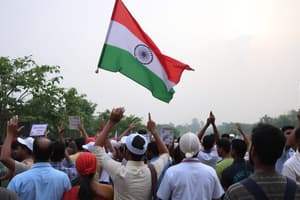Podcast
Questions and Answers
What type of jurisdiction does the Supreme Court have over cases involving the Government of India and one or more states?
What type of jurisdiction does the Supreme Court have over cases involving the Government of India and one or more states?
- Original jurisdiction (correct)
- Appellate jurisdiction
- Special leave jurisdiction
- Exclusive jurisdiction
In which type of cases does the Supreme Court have the discretion to grant special leave to appeal according to Article 136?
In which type of cases does the Supreme Court have the discretion to grant special leave to appeal according to Article 136?
- All civil matters
- Only criminal matters involving death sentences
- Any judgment, decree, or order (correct)
- All cases where the High Court has issued a certificate
Under what conditions can the Supreme Court hear an appeal in civil matters according to Article 133?
Under what conditions can the Supreme Court hear an appeal in civil matters according to Article 133?
- If the case is related to state vs. state disputes
- If the case involves a minor legal issue
- If all lower courts have ruled against the appellant
- If the case involves a substantial question of general importance (correct)
What type of cases can be directly appealed to the Supreme Court without requiring a certificate from the High Court?
What type of cases can be directly appealed to the Supreme Court without requiring a certificate from the High Court?
In which scenario does the Supreme Court exercise its appellate jurisdiction in civil matters?
In which scenario does the Supreme Court exercise its appellate jurisdiction in civil matters?
What is the role of the Supreme Court in cases where actions of the government are judged inconsistent with the constitution?
What is the role of the Supreme Court in cases where actions of the government are judged inconsistent with the constitution?
When can the Supreme Court exercise its original jurisdiction according to Article 131?
When can the Supreme Court exercise its original jurisdiction according to Article 131?
Under which jurisdiction can cases related to a substantial question of law relating to the interpretation of the Constitution be directly appealed to the Supreme Court?
Under which jurisdiction can cases related to a substantial question of law relating to the interpretation of the Constitution be directly appealed to the Supreme Court?
Study Notes
Parliamentary Government
- The core principle of a parliamentary government is the responsibility of the executive to the legislature consisting of the representatives of the people.
Environmental Movements in India
- Many environmental movements have emerged in India, especially after the 1970s.
- These movements have grown out of a series of independent responses to local issues in different places at different times.
Silent Valley Movement
- The silent valley is located in the Palghat district of Kerala.
- The idea of a dam on the river Kunthipuzha in this hill system was conceived by the British in 1929.
- The movement was first initiated by the local people and was subsequently taken over by the Kerala Sastra Sahitya Parishad (KSSP).
- Many environmental groups like the Narmada Bachao Andolan (NBA), Bombay Natural History Society (BNHS) and Silent Valley Action Forum participated in the campaign.
Chipko Movement
- Chipko Movement started on April 24, 1973, at Mandal of Chamoli district of Gharwal division of Uttarakhand.
- The Chipko is one of the world-known environmental movements in India.
- The movement was raised out of ecological destabilisation in the hills.
- Forest resource exploitation was considered the reason behind natural calamities like floods and landslides.
Anti-Corruption Laws in India
- Indian Penal Code, 1860.
- Prosecution section of Income Tax Act, 1961.
- The Prevention of Corruption Act, 1988.
- The Benami Transactions (Prohibition) Act, 1988 to prohibit benami transactions.
- Prevention of Money Laundering Act, 2002.
Agencies for Anti-Corruption in India
- Lokpal
- Lokayukta
- Central Bureau of Investigation
- Central Vigilance Commission
Women's Movement in India
- There are about 1.2 crore Self Help Groups (SHG) in India, most of which are all-women.
- The Indian women's movement has been recognized globally for its vibrancy.
Right to Information Act (RTI)
- The RTI came into force w.e.f. 12th October, 2005.
- The RTI empowers the people of India against administrative corruption, irregularities, and influences transparency in functioning of public authorities.
Salient Features of the Right to Information Act, 2005
- It provides a very definite day for its commencement i.e. 120 days from enactment.
- It shall apply to Public Authorities.
- All citizens shall have the right to information, subject to provisions of the Act.
- The Public Information Officers/Assistant Public Information Officers will be responsible to deal with the requests for information and also to assist persons seeking information.
- Fee will be payable by the applicant depending on the nature of information sought.
- Certain categories of information have been exempted from disclosure under Section 8 and 9 of the Act.
Supreme Court of India
- The Supreme Court of India is the highest judicial court and the final court of appeal under the Constitution of India, the highest constitutional court, with the power of judicial review.
Establishment and Constitution of Supreme Court
- The Supreme Court is established by Article 124 of the Constitution of India.
- The number of judges in the Supreme Court is determined by Parliament by law.
- The judges of the Supreme Court are appointed by the President.
Original Jurisdiction of the Supreme Court
- The Supreme Court has original jurisdiction in disputes between the Government of India and one or more States, or between two or more States.
Appellate Jurisdiction of the Supreme Court
- The Supreme Court has appellate jurisdiction in civil, criminal, and other proceedings, subject to the grant of a certificate by the High Court.
Judicial Review
- Judicial review is the power of the courts to examine the actions of the legislative, executive, and administrative arms of the government and to determine whether such actions are consistent with the constitution.
- Actions judged inconsistent are declared unconstitutional and, therefore, null and void.
Studying That Suits You
Use AI to generate personalized quizzes and flashcards to suit your learning preferences.
Description
Explore the significant environmental movements that have taken place in India, particularly after the 1970s. Learn about the Silent Valley Movement and other key initiatives driven by local issues and community activism.




